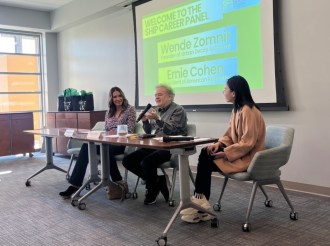On January 24, Sage Hill students gathered for a career panel on entrepreneurship. Wende Zomnir, founder of Urban Decay and Caliray, and Ernie Cohen, president of American Realcorp, also participated, giving students an inside look at the fast-paced and creative world of business.
Every aspiring entrepreneur has to start somewhere. Ernie Cohen's first side job in high school was selling flowers on street corners and making a fortune. He then entered the real estate industry and fell in love with the creativity that the job offered. For Wende Zomnir, it all happened 27 years ago in his Laguna Beach apartment. Since then, Urban Decay has grown significantly with each generation.
“A preacher came up to me and said, 'You're hiding behind that mask of makeup.' And I thought to myself, 'I'm not hiding at all. …I’m expressing myself.’ So that little moment turned into Urban Decay,” Zomnir said. “Take what made you angry and turn it into something. Turn it into something that brings you great happiness.”
When asked about a typical day in their lives, both panelists talked about the variety in their work. Seen through the eyes of two passionate entrepreneurs, everything moves around every corner and there's never a dull moment.
“My favorite thing about my job is that there are so many things I can do,” said Cohen, who has worked as a real estate developer for more than 40 years. He details the intricacies of real estate work, from development to construction to management.
Students were able to gain inside information on various aspects of working in the real estate industry, including more creative aspects such as choosing furniture and interior design. For Cohen, who originally wanted to be an artist when he was younger, real estate has given him the freedom and creativity he never had as an artist.
“I think the best thing about being an entrepreneur is that it rewards people who are generalists. It rewards people who like working on all aspects of the business,” Zomnia said. .
At large companies like Urban Decay and Caliray, business owners and their employees have a lot to work with. Zomnir highlights the subsections of her business that make working in the field of entrepreneurship so fascinating and refreshing. From developing your marketing strategy to your packaging options and the very appearance of your product, there's always something new to do.
But in a company that relies heavily on a marketable vision, there is a push and pull between creative and practical approaches. For visionaries in the entrepreneurial world, it's important to take time to also focus on the financial side of things.
“You have to be really resourceful…When I started my business, the challenge was getting people to take me seriously. I was a young woman. I had no experience in the beauty industry. There was no,” Zomnir said.
In a world where industry walls can be penetrated with the click of a Google search, it's easier to get started, but it's increasingly difficult to differentiate yourself in a crowded industry. When Zomnir wanted to incorporate nail polish, today's world lacked the resources to find a nail polish manufacturer.
“I went to a car paint shop…I asked where I could get car paint, and I called them and said did they make nail polish too, and they made it. I understood that,” Zomnir said.
After years of working in the business world, Zomnir and Cohen learned how to be resourceful, experienced their favorite parts of the job, and decided to share their story with an inspired audience. . But the biggest success wasn't the revenue or ratings it brought in.
“When you build a building, especially an apartment complex, you have a chance to drive by and see how beautiful it is. Then you walk inside and see kids running around having so much fun… Maybe it's on the sports court you designed or the playground you came up with…and the family looks so happy. That feels good to me,” Cohen said.
Over my years in the real estate industry, some of my most treasured moments exist outside of business-defined success. While other competing developers raised rents for families during the pandemic, Cohen rejected them.
“I didn't do it for gratitude,” Cohen said. “I did it because I wanted to be part of the solution, not part of the problem.”


